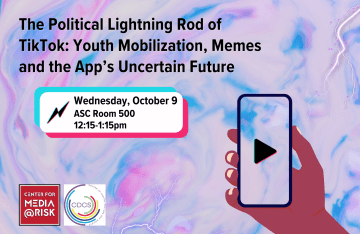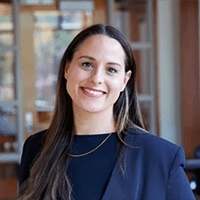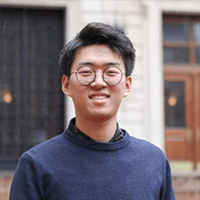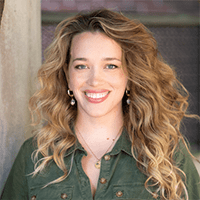
The Political Lightning Rod of TikTok: Youth Mobilization, Memes and the App’s Uncertain Future
- Annenberg School for Communication Room 500
Join us for a roundtable discussion on TikTok and youth mobilization, memes and the app's uncertain future.
About the Roundtable
TikTok has an electrifying effect. In the spring of 2024, it prompted a rare bipartisan Congressional agreement for a divest-or-ban bill that was signed into law in rapid succession by President Biden. In reaction to this threat, droves of young people called their Senators and even showed up to the U.S. Capitol in protest. Only a few months later, the platform has been widely attributed with setting off a powerful, meme-driven hype cycle for VP Kamala Harris’ presidential campaign. As a central node of youth-led movements and ongoing tensions over China-US relations, the app once written off as a place for lip-syncing and dancing has become a formidable player in our socio-political landscape. Spanning topics across the looming ban, shifts in the information ecosystem and geopolitical anxieties, this roundtable will explore TikTok’s increasingly central and uncertain role in contemporary politics.
About the Speakers
Roundtable

Robyn Caplan (PhD., Rutgers University) is an Assistant Professor at Duke University's Sanford School of Public Policy, a Senior Lecturing Fellow in Science & Society, a Faculty Affiliate at the DeWitt Wallace Center for Media & Democracy, a Research Affiliate at Data & Society Research Institute and an Affiliate with the Center for Information Technology and Policy at UNC-Chapel Hill. She received her PhD from the School of Communication and Information at Rutgers University. She conducts research at the intersection of platform governance and media policy. Her research examines the impact of inter-and-intra-organizational behavior on platform governance and content moderation. Prior to joining Duke University, she was a Senior Researcher at Data & Society Research Institute (2015-2023). Her most recent work investigates the origin and history of the verified badge, and the future role verification will play within internet policy.

Jules Terpak is a digital culture analyst and curator who initially grew her platform on TikTok. She has interviewed the likes of Noam Chomsky, Andrew Yang, and more to discuss the current state of technology and media. She previously wrote an advice column for the Washington Post about life online, as well as worked with Google to gather worldwide youth research and insights. Today, Jules is focused on taking her analyses and curation to the next level on YouTube.

Zeyi Yang is a senior writer for WIRED, covering technologies in China. He writes about a wide range of technologies including artificial intelligence, electric vehicles, semiconductors and social media. Born and raised in China, he is always on Western and Chinese social media at the same time and is fascinated by how they differ from but also resemble each other. He previously covered China tech for MIT Technology Review, where he wrote a weekly newsletter named China Report catching readers up on the latest trends, companies, policies and products in the country. He has also written for Protocol, Rest of World, Columbia Journalism Review, South China Morning Post, Nikkei Asia and other publications.
Moderator

Sara Reinis’s research investigates how algorithmically-driven social media brings commercial logic into the most intimate layers of identity formation, cultural norms, and community practices. Her work is broadly situated in the burgeoning field of algorithmic studies and her current research aims to bring this scholarship into conversation with religious studies in order to uncover how social media is molding belief systems and approaches to spirituality. Reinis's past research—conducted both independently and during her master’s program at NYU—has been largely focused on social media and its influence on a range of subjects including personal memory-making, notions of authenticity, gender performance and death.
Events
View AllDisclaimer: This event may be photographed and/or video recorded for archival, educational, and related promotional purposes. We also may share these video recordings through Annenberg's website or related platforms. Certain events may also be livestreamed. By attending or participating in this event, you are giving your consent to be photographed and/or video recorded and you are waiving any and all claims regarding the use of your image by the Annenberg School for Communication. The Annenberg School for Communication, at its discretion, may provide a copy of the photos/footage upon written request.
